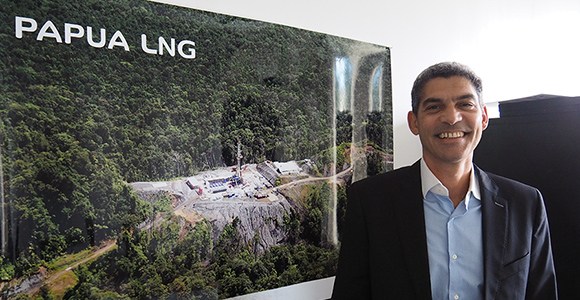Business Advantage PNG: What has the last twelve months been about for Total?
Philippe Blanchard: The last twelve months were mostly dedicated to progressing our Papua LNG development. We drilled Antelope 6 beginning of 2016 and we are currently drilling Antelope 7. This Antelope 7 well should be the last appraisal well. It is located to the west of the field and required to finalise the assessment of Elk Antelope resources. We have also started several field surveys required to perform the environmental and social impact assessments. That will provide us with the baseline which will be used to minimise the potential development impact on the communities and the environment.
Business Advantage PNG: So after you’ve finished that well, you’ll have a really good idea of exactly the extent of gas reserves?
Philippe Blanchard: Yes. We should have a clearer picture of what is in the ground and we hope that uncertainties will be strongly reduced.
Business Advantage PNG: There have been some interesting developments in the courts relating to the project, regarding ExxonMobil’s proposed acquisition of InterOil. What effect has that had on the project, if any?
Philippe Blanchard: Total is operator of the PRL 15 licence and we are continuing to work for delivering the project for the benefit of all stakeholders. We have moved forward on the appraisal programme, the development studies and the baseline surveys. It could not have been done without an engaged and contributive partnership and we thank our partners for this. We will maintain our engagement through this potential change of partnership.
Business Advantage PNG: There is a lot of interest in the infrastructure that’s going to go into Gulf Province and the location of any processing plant. There has also been discussion of possibly sharing facilities …
 A gas rig at Antelope 6—one of the wells that will feed the Papua LNG project. Source: InterOil
A gas rig at Antelope 6—one of the wells that will feed the Papua LNG project. Source: InterOilPhilippe Blanchard: In July 2015, we announced the different locations. It was a decision that was shared by the whole partnership. And we said that Papua LNG needed to be a cost-competitive project. A processing plant to separate the gas from the liquids on PRL 15 will be located in Gulf Province; there will be transportation pipelines bringing the gas and liquids to an LNG plant. Our decision was to consider a LNG plant in Caution Bay near Port Moresby as it will also allow us to explore synergies with other projects. If we can make a better project and save on costs, why not? It is our responsibility as operator.
Business Advantage PNG: You have mentioned previously that there is an opportunity to present LNG to the market in around 2022. Is that window still open?
Philippe Blanchard: Yes, with our planning as it stands today, that window is still open. It’s more 2022/2023 and all the teams are working hard to respect this target. This planning considers that FEED (Front End Engineering and Design) is due to start next year in 2017, for a final investment decision (FID) at the end of 2018. The construction will happen then between 2019 and 2022.
Business Advantage PNG: And if that’s the case, when do you start hiring here?
Philippe Blanchard: First keep in mind that the project is already benefiting the local communities as there are opportunities offered for logistics and drilling activities; however, more people will be employed in the coming years. Which year exactly ? I would say that it depends on what type of work needs to be done. There will be site preparations for the different locations followed by construction. So part of this could start in 2019.
Business Advantage PNG: How many staff have you got at the moment?
Philippe Blanchard: For Total we have, about 140/150 people. This personnel is located in Port Moresby but also on the ground on PRL15, where we have a logistics base, a drilling site and few surveys camps. In addition, we have contracted staff on these sites.
Performing drilling activities, as well as baseline surveys at the same time, requires to carry a lot of people from one place to the other, hence the logistics base and the personnel requirement. Therefore, to conduct all these operations, we are employing local civil works companies for building our well pads, local specialists or expertise through our contractors for the environmental and social baseline surveys.
And because we are running our activities from PNG, all our contractors have an office in Papua New Guinea. It is easier for interacting with them and checking directly how things are progressing without having to travel abroad.


